- Home
- Carl Deuker
Gym Candy
Gym Candy Read online
Gym Candy
Carl Deuker
* * *
HOUGHTON MIFFLIN COMPANY
BOSTON 2007
* * *
The author
wishes to thank
Ann Rider, the editor of this
book, for her help and
encouragement.
* * *
Copyright © 2007 by Carl Deuker
All rights reserved. For information about permission to reproduce
selections from this book, write to Permissions, Houghton Mifflin Company,
215 Park Avenue South, New York, New York 10003.
www.houghtonmifflinbooks.com
The text of this book is set in LinoLetter Roman.
Library of Congress Cataloging-in-Publication Data
Deuker, Carl.
Gym candy / by Carl Deuker.
p. cm.
Summary: Groomed by his father to be a star player, football is the only thing that
has ever really mattered to Mick Johnson, who works hard for a spot on the varsity
team his freshman year, then tries to hold onto his edge by using steroids, despite the
consequences to his health and social life.
ISBN-13: 978-0-618-77713-6 (hardcover)
ISBN-10: 0-618-77713-X (hardcover)
[1. Football—Fiction. 2. Fathers and sons—Fiction. 3. High schools—Fiction. 4.
Schools—Fiction. 5. Steroids—Fiction. 6. Family life—Washington (State)—Fiction.
7. Washington (State)—Fiction.] I. Title.
PZ7.D493Gym 2007
[Fic]—dc22
2007012749
Manufactured in the United States of America
MP 10 9 8 7 6 5 4 3 2 1
* * *
For Anne and Marian
PART ONE
1
My earliest memory is of an afternoon in June. I was four years old, and I was in the backyard with my dad. He'd just bought me a purple and gold mini football, my first football. He'd marked off an area of our backyard with a white chalk line. "Here's how it works, Mick.You try to run there," he said, pointing behind the line, "and I try to stop you." He shoved the mini football into the crook of my arm, led me to the far end of the yard, went back to the middle, got down on his knees, and yelled: "Go!"
I took off running toward the end zone. Our backyard is narrow, his arms are long, and even on his knees he could move fast enough to catch a four-year-old. Time after time I ran, trying to get by him. But he never let me have anything for nothing, not even then. Over and over he'd stretch out one of his arms and tackle me. Sometimes the tears would well up. "There's no crying in football," he'd say, which I guess is a joke from some Tom Hanks movie, and he'd send me back to try again.
And then I did it. I zigged when he was expecting a zag, and I was by him. I crossed the chalk line at the end of the yard, my heart pounding. I remember squealing for joy as I turned around. He was lying on the ground, arms reaching toward me, a huge smile on his face. "Touchdown Mick Johnson!" he yelled. "Your first touchdown!"
All those years, I believed that every kid in the neighborhood was jealous of me. And why not? I'd spent time at the houses of the boys on my block—Philip and Cory and Marcus. I'd seen their dads sprawled out on the sofa. Mostly they'd ignore me, but if they asked me something, it was always about school. I'd answer, and then they'd go back to their newspaper. These fathers drove delivery trucks or taught high school or worked in office buildings in downtown Seattle. They wore glasses, had close-cropped hair, and either had bellies or were starting to get them. Everything about them seemed puny.
My dad was bigger and stronger than any of them. His voice was deeper, his smile wider, his laugh louder. Like me, he has red hair, only his was long and reached his shoulders. He wore muscle T-shirts that showed his tattoos—on one shoulder a dragon, on the other a snake. He kept a keg of beer in the den, and whenever he filled his beer stein, he'd let me sip the foam off the top. The way he looked, the way he acted—those things alone put him a million miles above every other kid's father. But there was one last thing that absolutely sealed the deal—my dad was a star.
Our den proved it. It was down in the basement, across from my mom's laundry room, and it was filled with scrapbooks and plaques and medals. Two walls were covered with framed newspaper articles. It was the headlines of those articles that told his story. I used to go downstairs into the den, pick up one of the game balls that he kept in a metal bin in the corner, and walk around and read them, feeling the laces and the leather of the football as I read. MIKE JOHNSON SETS HIGH SCHOOL YARDAGE RECORD ... MIKE JOHNSON LEADS HUSKIES OVER USC ... MIKE JOHNSON NAMED TO ALL-PAC TEN FIRST TEAM ... MIKE JOHNSON SELECTED IN THIRD ROUND.
Sometimes my dad would come in while I was staring at the walls. He'd tell me about a touchdown run he'd made in a rainstorm against Cal or the swing pass in the Sun Bowl that he'd broken for sixty-five yards. When he finished with one of his stories, he'd point to the two bare walls. "Those are yours, Mick," he'd say. "You're going to fill them up with your own headlines."
My mom had been a top gymnast at the University of Washington the same years my dad was on the football team. She runs around Green Lake every morning, and she used to do the Seattle-to-Portland bicycle race, so she knows all about competition. But every time she heard my dad talk about me making the headlines, she'd put her hands on my shoulders and look at me with her dark eyes. "You don't have to fill any walls with anything," she'd say. "You just be you." Then she'd point her finger at my dad. "And you stop with all that 'bare walls' stuff."
My dad would laugh. "A little pressure is good for a boy. Keeps him on his toes."
2
I started kindergarten a year later than most kids, so all my life I've been older than my classmates. When kids hear you're a year older, they assume you're stupid, but my mom says I knew my numbers and most of the letters of the alphabet and that I was ready for school. Holding me out was my dad's idea.
I don't really remember too much about it, other than that I was sad because I had to spend the mornings at Ballard Lutheran Preschool and wouldn't get a metal lunch pail like Cory Ginski, who was going to North Beach Elementary. I started crying about that at dinner, and my dad took me aside and told me I'd have an edge later on.
I didn't understand what he was talking about then, but I figured it out once I started Pop Warner football in third grade. My dad petitioned the league to let me play on a team with my classmates even though I was older, and his petition was approved. The rest of the kids in my class were trying to figure out which way they were going, but my dad had taught me how to cut back against the grain, how to reverse fields, how to straight-arm tacklers. Add to that the extra year I had on everyone and it was no contest: I was a star in Pop Warner from day one.
I loved it. Who wouldn't? I scored a bunch of touchdowns, made the all-league teams, got the MVP trophies at the team banquets. Ninety-nine percent of the time I didn't think about being older than the kids I was playing against. But every once in a while I'd remember, and my body would tense up and my face would redden. I thought about asking my dad to let me play in my real age bracket, but I never did.
In the off-season, my dad would sign me up for every football camp he could find, even if it meant driving hours to get there. As I got older, he set up more and more football equipment in our yard. Blocking sleds, nets, tires for agility drills. My mom didn't like it that everything was football, football, football. "Mick needs some balance in his life," she'd say.
"What would you like him to do?" my dad would answer. "He's going to be way too big for gymnastics."
"I don't know. But something other than football three hundred and sixty-five days a year."
Whenever
they had that argument, my dad always turned to me. "Do you want to turn out for soccer this year, Mick?" he'd ask.
I'd shake my head.
"How about basketball or baseball?"
"No," I'd say.
"Chess? The Math Olympiad?"
"I just want to play football."
My dad would smile; my mom would shake her head; and that would be the end of it—for a while.
It was true what I said—that I loved football. But something else was true, too. I'd played basketball a little, played baseball a little, played soccer a little. I'd played them all enough to know that I was nothing special in any of them and never would be. If I was going to make my mark, it was going to be on the football field.
3
You can go along thinking your dad's perfect for a long time, but not forever. I don't know exactly when I started to figure out that everything didn't add up. Maybe fourth or fifth grade, but for sure by middle school I knew.
My mom worked at a bank in the loan department. She worked regular hours like everybody else's parents. But my dad's job was different, which was why he was the one who took me to practices and why he was home most days after school.
He had the early shift—five to ten in the morning—at a talk radio station that covered sports twenty-four hours a day. The show was called Ben in the A.M. Ben Braun was the host and did seventy-five percent of the talking. My dad was the second guy. "I fill in when Ben runs out of things to say," he said, explaining his job to Grandpa Leo one Christmas. "But, let me tell you, that isn't too often."
Ben Braun had been to our house a few times, but only a few, because my mom didn't like him. He was a little guy with strangely short arms, a loud voice, and a louder laugh. He talked with his mouth full of food, and when he told a joke, he'd bang his fist down on the table, making the silverware jump. "The man is obnoxious," my mom said every time after he left. "Absolutely obnoxious."
"He's my boss," my dad would say. "We've got to invite him over sometimes."
Ben Braun had never played any sport, so I didn't understand why he talked so much while my dad said so little. "He's got the radio voice and he's got the college degree," my dad explained when I asked him about it. "That's the way it works."
I tried to listen to the show before I went to school. I wanted to like it, but I had trouble following it. Sometimes they'd talk about movie stars or singers for ten minutes straight. One thing I did notice. Instead of calling my dad "Mike," lots of times Ben Braun would say: "Let's see what Mr. Third-Rounder has to say about that," and then he'd laugh that big laugh of his.
I'd probably heard him call my dad "Mr. Third-Rounder" a dozen times before I asked my mom why he did that. She flushed red. "Because Ben Braun is a mean man," she said. "A mean man with a cruel sense of humor. I wish your father didn't have to work with him, and I wish you wouldn't listen to him."
I didn't say anything more. I knew she didn't want to talk about it, whatever it was. But all day at school, I thought about it. Mr. Third-Rounder ... Mr. Third-Rounder ... Mr. Third-Rounder.
After school that day, I went downstairs to the den and looked once more at the framed headlines. The last one read MIKE JOHNSON SELECTED IN THIRD ROUND. That had always been my favorite headline because it meant that my dad had made it to the NFL. So what was funny about it? What was Ben Braun laughing at?
I stared at the headline and stared at it, and then, I got it—I got Ben Braun's joke. The wall next to that framed article was bare—it was my wall to fill. But that's what was wrong—that bare wall. It had always been wrong, and for a long time some part of me had known it. I followed the NFL. First-round picks are absolute locks to make it. But to be selected in the third round, you still have to be one of the best college football players in the nation. Joe Montana, the greatest quarterback of all time, was a third-round draft choice. My dad should have played professional football for ten years. The bare wall should have been full of NFL headlines, but there wasn't one. He'd grabbed the headlines in college; as a pro he'd done nothing.
I climbed back upstairs. My dad was in the kitchen, sitting on a stool, eating peanuts. "I thought I heard you come in," he said. "How about we go to the park, throw the ball around a little? I want to give you practice catching balls that come to you over the wrong shoulder."
"Yeah, sure," I said, but instead of moving, I just stood.
"Well," he said, reaching for his jacket, "are we going?"
"Dad, did you ever play for the Chargers?"
He put the jacket down. "I got drafted by the Chargers. Third round. You know that."
"But did you ever play?"
"A couple of preseason games. Yeah."
"And then what happened?"
His voice went flat. "Then I sprained my ankle. A high ankle sprain, the worst kind. My foot turned purple from my toe to my calf. I tried to come back too early, and I resprained it. The Chargers kept me on their injured reserve list, hoping I'd recover, but it never came around. It still isn't right."
"So it was an injury. That's why you didn't play."
"I just told you. Why all the questions?"
"No reason."
We went to the park then, but he didn't pay much attention to what I was doing, didn't offer suggestions. We quit after half an hour.
After dinner, I half watched television, half played video games, and then took a shower and went to bed. Around nine-thirty, my mom came in to say good night, which was normal. Later, I was almost asleep when the door opened again and my father came in, which wasn't.
"You awake, Mick?" he said as he sat down on the edge of the bed.
"Yeah, Dad," I said. "I'm awake."
For a while he just sat. When he finally spoke, his voice was low. "I don't want you to think my NFL career amounted to nothing, because that's not true. The house you're living in? The bed you're sleeping on? The furniture? You know who bought those things?" He tapped himself on the chest. "I bought them, that's who. And do you know how I bought them? I bought everything with my money from the San Diego Chargers. Five hundred thousand dollars, that's what my signing bonus was. That's NFL money. Money I made as a professional football player. A half million dollars. That's not nothing, Mick, and don't ever let anybody tell you it is. You understand what I'm saying?"
"Yeah, I understand," I said, a little frightened of him.
"All right then," he said. "Go to sleep."
After he left I lay in the dark, confused not by what he had said but by what he hadn't. For the first time I understood that deep down inside my dad was unhappy.
I'd always bragged some to the guys at school and on my teams about what a great football player my dad had been. It makes no sense, but after that night I bragged more than ever. Every one of his stories grew in my retelling. If he told me he broke four tackles and scampered thirty-three yards against Stanford, or turned a five-yard swing pass into a twenty-five-yard touchdown against Oregon, then I told my friends that he broke six tackles and raced forty-eight yards against Stanford and broke a sixty-yard touchdown pass against Oregon. You'd think I would have kept my mouth shut.
4
In seventh grade my teacher, Mr. Pengilly—a little guy with a wispy beard that made him look like a goat—had us write about our favorite activity. Mine was football, of course. I wrote that it was fun and that I liked to score touchdowns and hear people cheer for me. I turned it in, and a week later I got it back with an F at the top. "You need to make the game come alive," he had written in the margin. "This is dead."
I've never been a great student, but I'm a good student, and that was the first F I'd ever gotten on anything. I was mad, and all through class I glared at him. What did he know about football? Nothing. When the bell rang I headed to the door, but Mr. Pengilly's voice stopped me. "Come here, Mick," he said.
I marched over to his desk.
"You didn't like that grade?"
"No, I didn't."
"You can redo the paper, you know."
&nbs
p; "Football is what I like," I said.
"You don't have to change your topic. Just make me feel what you feel when you're playing. What you've written could apply to Ping-Pong or ice dancing. Tell me what's different about football."
"I don't know what's different about it," I muttered.
"Sure you do, Mick. You just need to think more before you write."
On my way out, I threw my paper into the trash and tried to forget about it. But I couldn't. So that night I did what Pengilly told me to do—I thought it through. And I realized that what I'd written was junk. Worse than junk, because most of it was a lie. Football isn't fun; it's hard work. The drills are grueling and the games are worse. The risk of injury is there on every play, and even if you don't get hurt, when you wake up the morning after a game your whole body feels as if it's been put through a huge washing machine. And running backs—my position—have it worst of all. For a running back, every game is like being in a street fight with the numbers stacked against you. You're trying to take the ball up the field, and all the guys on defense have the same goal—and it's not just to stop you. They want to punish you; they want to make you pay in blood for every inch you gain.
And there it was—the reason I love the game. I love it because it is so hard. I love it because every single play is a challenge of every single part of me—body and mind. Being physically tough isn't enough. Lots of tough guys quit football. You have to be mentally tough to keep going when every muscle in your body is screaming: "Stop!"
But if you don't stop, if you make yourself stay out there, if you take on the challenge—the payoff is unreal. I thought back to my best runs, my greatest moments. On some of them, it was as if I were a hummingbird, darting through tiny holes, breaking into the open, flying down the field for a touchdown. On others, I felt more like a bull, crashing straight ahead, legs churning, fighting for inches. And on the best, I was the bullet coming out of the barrel of a gun. That's the thrill of football, that's what makes it better than any other game—the speed and the power, the shifting from one to the other, the fighting through the pain, the fighting through the fear, the coming out on the other side, ball above my head, crowd roaring: Touchdown! Touchdown! Touchdown!

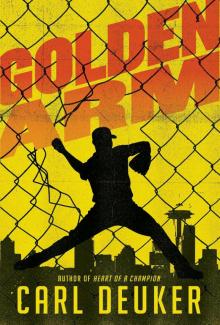 Golden Arm
Golden Arm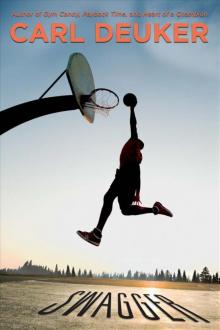 Swagger
Swagger Gym Candy
Gym Candy Night Hoops
Night Hoops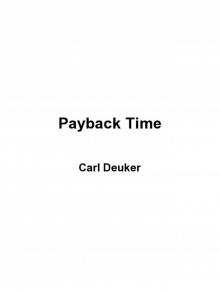 Payback Time
Payback Time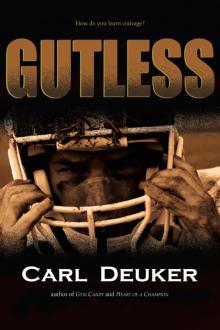 Gutless
Gutless Runner
Runner High Heat
High Heat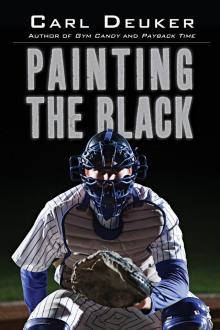 Painting the Black
Painting the Black